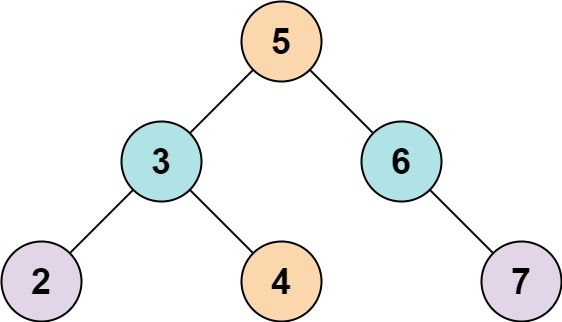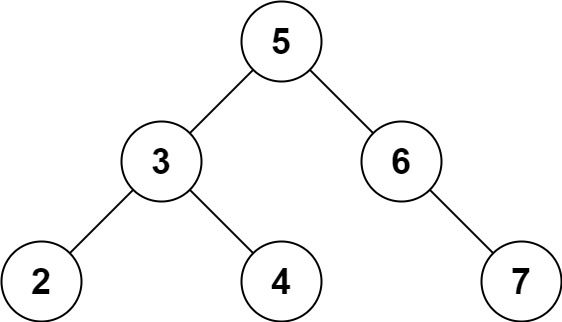| comments | difficulty | edit_url | tags | |||||||
|---|---|---|---|---|---|---|---|---|---|---|
true |
Easy |
|
Given the root of a binary search tree and an integer k, return true if there exist two elements in the BST such that their sum is equal to k, or false otherwise.
Example 1:
Input: root = [5,3,6,2,4,null,7], k = 9 Output: true
Example 2:
Input: root = [5,3,6,2,4,null,7], k = 28 Output: false
Constraints:
- The number of nodes in the tree is in the range
[1, 104]. -104 <= Node.val <= 104rootis guaranteed to be a valid binary search tree.-105 <= k <= 105
# Definition for a binary tree node.
# class TreeNode:
# def __init__(self, val=0, left=None, right=None):
# self.val = val
# self.left = left
# self.right = right
class Solution:
def findTarget(self, root: Optional[TreeNode], k: int) -> bool:
def dfs(root):
if root is None:
return False
if k - root.val in vis:
return True
vis.add(root.val)
return dfs(root.left) or dfs(root.right)
vis = set()
return dfs(root)/**
* Definition for a binary tree node.
* public class TreeNode {
* int val;
* TreeNode left;
* TreeNode right;
* TreeNode() {}
* TreeNode(int val) { this.val = val; }
* TreeNode(int val, TreeNode left, TreeNode right) {
* this.val = val;
* this.left = left;
* this.right = right;
* }
* }
*/
class Solution {
private Set<Integer> vis = new HashSet<>();
private int k;
public boolean findTarget(TreeNode root, int k) {
this.k = k;
return dfs(root);
}
private boolean dfs(TreeNode root) {
if (root == null) {
return false;
}
if (vis.contains(k - root.val)) {
return true;
}
vis.add(root.val);
return dfs(root.left) || dfs(root.right);
}
}/**
* Definition for a binary tree node.
* struct TreeNode {
* int val;
* TreeNode *left;
* TreeNode *right;
* TreeNode() : val(0), left(nullptr), right(nullptr) {}
* TreeNode(int x) : val(x), left(nullptr), right(nullptr) {}
* TreeNode(int x, TreeNode *left, TreeNode *right) : val(x), left(left), right(right) {}
* };
*/
class Solution {
public:
bool findTarget(TreeNode* root, int k) {
unordered_set<int> vis;
function<bool(TreeNode*)> dfs = [&](TreeNode* root) {
if (!root) {
return false;
}
if (vis.count(k - root->val)) {
return true;
}
vis.insert(root->val);
return dfs(root->left) || dfs(root->right);
};
return dfs(root);
}
};/**
* Definition for a binary tree node.
* type TreeNode struct {
* Val int
* Left *TreeNode
* Right *TreeNode
* }
*/
func findTarget(root *TreeNode, k int) bool {
vis := map[int]bool{}
var dfs func(*TreeNode) bool
dfs = func(root *TreeNode) bool {
if root == nil {
return false
}
if vis[k-root.Val] {
return true
}
vis[root.Val] = true
return dfs(root.Left) || dfs(root.Right)
}
return dfs(root)
}/**
* Definition for a binary tree node.
* class TreeNode {
* val: number
* left: TreeNode | null
* right: TreeNode | null
* constructor(val?: number, left?: TreeNode | null, right?: TreeNode | null) {
* this.val = (val===undefined ? 0 : val)
* this.left = (left===undefined ? null : left)
* this.right = (right===undefined ? null : right)
* }
* }
*/
function findTarget(root: TreeNode | null, k: number): boolean {
const dfs = (root: TreeNode | null) => {
if (!root) {
return false;
}
if (vis.has(k - root.val)) {
return true;
}
vis.add(root.val);
return dfs(root.left) || dfs(root.right);
};
const vis = new Set<number>();
return dfs(root);
}// Definition for a binary tree node.
// #[derive(Debug, PartialEq, Eq)]
// pub struct TreeNode {
// pub val: i32,
// pub left: Option<Rc<RefCell<TreeNode>>>,
// pub right: Option<Rc<RefCell<TreeNode>>>,
// }
//
// impl TreeNode {
// #[inline]
// pub fn new(val: i32) -> Self {
// TreeNode {
// val,
// left: None,
// right: None
// }
// }
// }
use std::cell::RefCell;
use std::collections::{HashSet, VecDeque};
use std::rc::Rc;
impl Solution {
pub fn find_target(root: Option<Rc<RefCell<TreeNode>>>, k: i32) -> bool {
let mut set = HashSet::new();
let mut q = VecDeque::new();
q.push_back(root);
while let Some(node) = q.pop_front() {
if let Some(node) = node {
let mut node = node.as_ref().borrow_mut();
if set.contains(&node.val) {
return true;
}
set.insert(k - node.val);
q.push_back(node.left.take());
q.push_back(node.right.take());
}
}
false
}
}# Definition for a binary tree node.
# class TreeNode:
# def __init__(self, val=0, left=None, right=None):
# self.val = val
# self.left = left
# self.right = right
class Solution:
def findTarget(self, root: Optional[TreeNode], k: int) -> bool:
q = deque([root])
vis = set()
while q:
for _ in range(len(q)):
node = q.popleft()
if k - node.val in vis:
return True
vis.add(node.val)
if node.left:
q.append(node.left)
if node.right:
q.append(node.right)
return False/**
* Definition for a binary tree node.
* public class TreeNode {
* int val;
* TreeNode left;
* TreeNode right;
* TreeNode() {}
* TreeNode(int val) { this.val = val; }
* TreeNode(int val, TreeNode left, TreeNode right) {
* this.val = val;
* this.left = left;
* this.right = right;
* }
* }
*/
class Solution {
public boolean findTarget(TreeNode root, int k) {
Deque<TreeNode> q = new ArrayDeque<>();
q.offer(root);
Set<Integer> vis = new HashSet<>();
while (!q.isEmpty()) {
for (int n = q.size(); n > 0; --n) {
TreeNode node = q.poll();
if (vis.contains(k - node.val)) {
return true;
}
vis.add(node.val);
if (node.left != null) {
q.offer(node.left);
}
if (node.right != null) {
q.offer(node.right);
}
}
}
return false;
}
}/**
* Definition for a binary tree node.
* struct TreeNode {
* int val;
* TreeNode *left;
* TreeNode *right;
* TreeNode() : val(0), left(nullptr), right(nullptr) {}
* TreeNode(int x) : val(x), left(nullptr), right(nullptr) {}
* TreeNode(int x, TreeNode *left, TreeNode *right) : val(x), left(left), right(right) {}
* };
*/
class Solution {
public:
bool findTarget(TreeNode* root, int k) {
queue<TreeNode*> q{{root}};
unordered_set<int> vis;
while (!q.empty()) {
for (int n = q.size(); n; --n) {
TreeNode* node = q.front();
q.pop();
if (vis.count(k - node->val)) {
return true;
}
vis.insert(node->val);
if (node->left) {
q.push(node->left);
}
if (node->right) {
q.push(node->right);
}
}
}
return false;
}
};/**
* Definition for a binary tree node.
* type TreeNode struct {
* Val int
* Left *TreeNode
* Right *TreeNode
* }
*/
func findTarget(root *TreeNode, k int) bool {
q := []*TreeNode{root}
vis := map[int]bool{}
for len(q) > 0 {
for n := len(q); n > 0; n-- {
node := q[0]
q = q[1:]
if vis[k-node.Val] {
return true
}
vis[node.Val] = true
if node.Left != nil {
q = append(q, node.Left)
}
if node.Right != nil {
q = append(q, node.Right)
}
}
}
return false
}/**
* Definition for a binary tree node.
* class TreeNode {
* val: number
* left: TreeNode | null
* right: TreeNode | null
* constructor(val?: number, left?: TreeNode | null, right?: TreeNode | null) {
* this.val = (val===undefined ? 0 : val)
* this.left = (left===undefined ? null : left)
* this.right = (right===undefined ? null : right)
* }
* }
*/
function findTarget(root: TreeNode | null, k: number): boolean {
const q = [root];
const vis = new Set<number>();
while (q.length) {
for (let n = q.length; n; --n) {
const { val, left, right } = q.shift();
if (vis.has(k - val)) {
return true;
}
vis.add(val);
left && q.push(left);
right && q.push(right);
}
}
return false;
}
